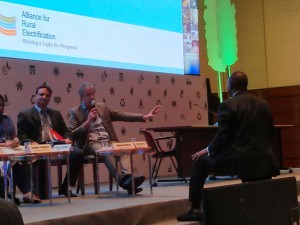 Ahead of the next Smart Villages workshop focusing on the ASEAN region, we (Dr Heather Cruickshank and Molly Hurley-Depret) traveled to Manila to attend two recent conferences focusing on Asia and energy: the International Off-Grid Renewable Energy Conference and Exhibition (IOREC) and the Asia Clean Energy Forum 2014 (ACEF), held 16-20 June at the Asian Development Bank in Manila, Philippines.
Ahead of the next Smart Villages workshop focusing on the ASEAN region, we (Dr Heather Cruickshank and Molly Hurley-Depret) traveled to Manila to attend two recent conferences focusing on Asia and energy: the International Off-Grid Renewable Energy Conference and Exhibition (IOREC) and the Asia Clean Energy Forum 2014 (ACEF), held 16-20 June at the Asian Development Bank in Manila, Philippines.
We thought it was an excellent opportunity to meet people who could attend our next Smart Villages Workshop in Malaysia which will focus on Southeast Asia. The people we met had two points in common: a deep and passionate commitment to their work for energy access and the fortitude to achieve this goal despite all odds.
Nano-, micro-, and mini-grid financing
We were excited to see enthusiasm for nano-, micro- and mini-grids, technologies that can really make a difference to millions if they achieve scale. The question of how to fund these off-grid systems was the subject of much debate. Should banks fund them? Should angel investors provide start-up capital? Or should governments and donors take equity in them?
 Attendees (and we) felt that ‘all of the above’ was the answer and it truly does depend on the particular project and the level of risk involved.
Attendees (and we) felt that ‘all of the above’ was the answer and it truly does depend on the particular project and the level of risk involved.
One point on which almost everyone seemed to agree – market-based and service-focused approaches to off-grid energy are likely the most sustainable in the long-term. Several speakers told their stories of providing energy services in Nepal and Bangladesh as well as East Africa. It was impressive to see the success stories as well as the stories of failure. However, there is no true failure, only lessons to learn.
We were nodding and taking note as many of these themes also emerged at the Smart Villages initiative’s recent workshop focusing on East Africa. To us, it is so crucial to see the linkages and differences between world regions and this was also in evidence at IOREC/ACEF.
‘Productive uses’ of energy
 We also found it fascinating to think about solar home systems (SHS) alongside community infrastructure for productive uses, like education and training or community businesses. It seems that energy entrepreneurs and policymakers are all considering bigger impacts which are truly at the core of any ‘smart village’ where people can achieve their personal and collective goals, whatever those might be.
We also found it fascinating to think about solar home systems (SHS) alongside community infrastructure for productive uses, like education and training or community businesses. It seems that energy entrepreneurs and policymakers are all considering bigger impacts which are truly at the core of any ‘smart village’ where people can achieve their personal and collective goals, whatever those might be.
It reminded us of our recent visit to Terrat, a Maasai village in Tanzania that uses a bio-diesel mini-grid to power a radio station, a cheese-making business and many small businesses like grain millers, barbers and welders. Capacity building and training were also big themes – whether for consumers, financial institutions or entrepreneurs themselves. All of these types of capacity building can help villages to become stronger and more economically buoyant in the long-term, whether by funding reading skills and computer training or fresh thinking on financing and risk.
Policy and regulation for off-grid energy
The importance of policy and regulation forms part of the core of the Smart Villages initiative. Without the right policies and regulations for energy – and government commitment to them – energy access by 2030 may not become a reality. Luckily, there are many committed people keen to ensure that this goal is reached. Perhaps most crucially during the week, scale was never forgotten. There was truly a sense that everyone in the room wanted to reach the largest number of the people possible, both for humanitarian and business goals.
Scaling up for 2030 goal
Scale is a necessity and the Smart Villages initiative strongly supports policies, regulations and of course business models that prioritise achieving scale. However, there were not enough financial institutions and other types of investors present. The public sector was well-represented, but aside from SMEs, where was the private sector, particularly big financial institutions and multinationals with CSR funds? The conference agreed that this will be a continuing goal. This is also crucial to our smaller-scale workshops and we found that it truly makes a difference in the scope of discussion that we’re able to have.
ACEF energy tracks
What is next?




